British Virgin Islands
Culture Name
British Virgin Islander
Alternative Name
BVI, Virgin Islander
Orientation
Identification. The British Virgin Islands (BVI) is part of the Virgin Islands archipelago, which also includes the United States Virgin Islands (USVI) of Saint Thomas, Saint John, and Saint Croix. Christopher Columbus named the Virgin Islands after Saint Ursula and her eleven thousand martyred virgins. Tortola is the largest and most densely populated of the British Virgin Islands and is separated from Saint Thomas by a narrow and easily traversed sea channel. This physical proximity contributed to a long history of social and economic interaction and interdependence between the BVI and the USVI, and British Virgin Islanders reflect this history in their occasional use of the term "Virgin Islanders" to refer to themselves. Nevertheless, British Virgin Islanders express a strong sense of their distinctiveness, pointing to the more serene and rural nature of their island life, their economic well-being, and their independent and friendly character as key differences between the BVI and the USVI.
Location and Geography. Comprising thirty-six islands with a total landmass of 59 square miles (153 square kilometers), the BVI lie 50 miles (80 kilometers) east of Puerto Rico, in the northeastern Caribbean Sea. Tortola is the largest of the sixteen inhabited islands of the BVI, followed by Anegada, Virgin Gorda, and Jost Van Dyke. The capital of the BVI, Road Town, is on Tortola. With the exception of Anegada, which is a low-lying coral atoll, the islands of the BVI are hilly and dry, with rugged coastlines interrupted by coves, sandy beaches, and palm and mangrove swamps. The climate is subtropical and humid, with an annual rainfall of 27 inches (69 centimeters) and limited freshwater resources. Temperatures range from 72 to 88 degrees Fahrenheit (22 to 31 degrees Celsius) and are moderated by trade winds all year. BVI's tropical climate and sandy beaches attract 400,000 tourists annually.
Demography. The population of the BVI is approximately twenty thousand, with three-quarters on Tortola. Fifty percent of the population is made up of native British Virgin Islanders, with the remainder comprised largely of nationals from other Caribbean countries. Of the total BVI population, 90 percent is of African descent, with the remainder being of Amerindian, East Indian, and Middle Eastern descent, or white expatriates.
Linguistic Affiliation. English is the official language of the BVI, with both formal and creole variants spoken.
Symbolism. British Virgin Islanders are proud of the beauty of their islands and have a strong protective attitude toward their natural resources and their land. This is symbolized by the coat of arms that appears on the BVI flag and on many official publications that depict Saint Ursula framed by eleven oil lamps, which represent the eleven thousand virgins after whom the BVI were named. Beneath Saint Ursula is a scroll that reads, in Latin, Vigilate (Be careful). BVI flora and fauna are symbolized on national stamps, and the tourist board's depiction of the BVI as "Nature's Little Secrets" also is a source of national pride. However, the symbol that is most significant to BVI's national identity is land. British Virgin Islanders point proudly to the fact that the majority of BVI land remains in British Virgin Islanders' hands, and British Virgin Islanders attribute their independent character and strong economy to this fact.
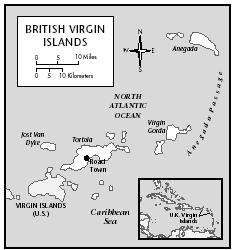
Historic and Ethnic Relations
Emergence of the Nation. The Virgin Islands were settled by indigenous people in about 100 B.C.E. , and were encountered by Columbus on 22 October 1493. Throughout the fifteenth and sixteenth centuries the BVI were under Spanish control, during which time the islands provided temporary anchorages for Spanish convoys hiding from English privateers. The Dutch on Tortola established the first permanent European settlement, in 1602, but by 1666 they had been replaced by English planters. Due to its arid climate and hilly terrain, the BVI were one of the more unprofitable of Great Britain's plantation islands during the colonial period. As a British colony, the BVI were administered as part of the Leeward Islands Federation from 1872 to 1956. From 1902, when the local BVI legislature was abolished, to 1950, when it was reconstituted, the BVI experienced little in the way of direct governance by Great Britain.
With the breakup of colonial rule in the eastern Caribbean in 1956, the BVI declined both amalgamation with the USVI and membership in the now defunct West Indies Federation of British Islands (1958–1962). Constitutional reform in 1967 established the BVI as a British dependent territory, with a locally elected legislature and chief minister, and also established the U.S. dollar as the official national tender. Increased BVI political autonomy was matched by increased economic autonomy, related to the development of a successful tourism economy beginning in 1962, and the development of an offshore financial services sector beginning in the early 1980s. The expansion of the BVI economy was accomplished through extensive reliance upon imported labor. Of the present-day BVI population of twenty thousand, half are non-British Virgin Islanders drawn to work in its burgeoning tourist and financial services economies. Throughout this period of rapid growth, the BVI maintained a high degree of political and social stability and its present-day per capita income of $26,903 (U.S.) is exceeded only by the per capita incomes of the Bahamas, Bermuda, and the Cayman Islands in the Caribbean. The economic development that fostered radical demographic and social change has gone hand in hand with a growth in BVI nationalist sentiment.
National Identity. As legislative changes abetted BVI political autonomy and consolidation and as economic prosperity fostered a sense of economic security, improved transportation and communication among far-flung BVI islands and communities made possible centralized banking and a national educational system. Concurrently, BVI economic dependence on the USVI diminished. Meanwhile, initiatives promoting a national culture also were launched, muting long-standing distinctions among different communities of British Virgin Islanders. The establishment in 1954 of a national beauty contest, in 1957 of Saint Ursula's Day as a national holiday, in 1979 of a national folk dance troupe, in 1982 of a Ministry of Culture, and the publication in 1984 of a comprehensive collection of BVI folk tales, songs, and recipes all provided bases for the people inhabiting the BVI to think of themselves as members of a nation.
Ethnic Relations. The present-day BVI is a more ethnically diverse country than it was in the mid-1970s. Legislation giving British Virgin Islanders preference in hiring and in the allocation of trade licenses, and restricting alien land ownership has resulted in some disaffection within the non-BVI population. While many British Virgin Islanders express the desire to retain BVI resources and land for British Virgin Islanders, they also recognize the need to acknowledge the contributions of non-British Virgin Islanders to the economy and society, and to provide for their inclusion in BVI public culture.
Urbanism, Architecture, and the Use of Space
BVI architecture is strongly influenced by Caribbean vernacular style. One finds numerous examples of traditional wooden hip-roofed houses throughout the countryside, and even contemporary buildings, that are constructed of concrete and cinder block incorporate into their design wide verandas, high ceilings, hip roofs, and bright colors. Building codes establish strict guidelines for new home construction, and government legislation limits the size and height of hotels. While Road Town is the capital and urban center of the BVI, the traditional architecture along its main street, the lack of any traffic signals, the presence of open tracts of land, and open vistas to the sea provide a distinctly rural air. Most British Virgin Islanders live outside of "town" and tend to identify most closely with the community or region in which they live.
In communities throughout the BVI, a large, centrally located shade tree frequently serves as a spot for gathering, passing news, and discussing current events. All sporting events and the annual summer festival commemorating emancipation are held in Road Town and draw people from throughout the BVI. A cultural center in Road Town and the atrium of the main building of H. Lavity Stoutt Community College serve as sites for large indoor events.
Food and Economy
Food in Daily Life. The BVI diet features johnnycake, peas and rice, fish and salt fish, mutton and goat, "ground provisions" such as tania, sweet potatoes and plantains, and an array of soups: fish soup, bullfoot soup, goat head soup, pea soup, and pumpkin soup. Most food is highly seasoned, and soups are commonly served with dumplings. A favorite local dish is fungi (cornmeal and okra) and fried fish; favored beverages are drinks made from local fruits, and include limeade, soursop, mauby, and passion fruit. Other Caribbean foods, such as jerk chicken, roti (a curry-filled pancake), and patties (meat and fish-filled dumplings) also are making their way into the BVI diet, as are imported processed foods and snacks.
Food Customs at Ceremonial Occasions. Secular and religious holidays are occasions for the preparation of special foods, with fish soup and dumplings, peas and rice, salt fish, stewed mutton, curried goat and grilled local fish preferred. Traditionally, Good Friday dinner is a meatless meal featuring salt fish, peas and rice, and dukuna (a spiced sweet potato and coconut pudding wrapped in plantain leaf and steamed). Traditional Christmas foods include guavaberry wine and guavaberry tart, both made from a small-berry-like fruit that grows on trees.
Basic Economy. Tourism and financial services are the mainstays of the BVI economy, generating 90 percent of the national income. The agricultural sector accounts for less than 10 percent of the national income, and is restricted to food crops and pasture.
Land Tenure and Property. Land is the basis of British Virgin Islanders' sense of autonomy and independence. The concept of "family land"—land held in common by members of a family—assumes a pivotal role in defining and structuring social relations and developing a concept of self. Although a Cadastral survey in the 1970s provided a map and registry of all BVI lands, disputes continue over the appropriate division of these lands among individuals making claims to their use. The conceptual and cultural importance of land is reflected in government legislation that places strict restrictions on alien land ownership and development.
Commercial Activities. Most commercial activities are related to tourism and financial services and include a flourishing charter yacht and water sports industry, restaurants and bars, guesthouses, villas and small luxury hotels, banks, trust companies, communications and telecommunications, and real estate sales and management.
Major Industries. The two major BVI industries are tourism and financial services. Light industries include a rum distillery, concrete block and construction aggregate manufacture, and yacht maintenance and repair.
Trade. The BVI trade with the United States, the USVI, Puerto Rico, and the United Kingdom. BVI exports include bananas, livestock, fresh fish, rum, and construction aggregates. Principal imports to the BVI are automobiles, building materials, foodstuffs, and machinery.
Division of Labor. In the contemporary economy most people work in commercial and service activities, and labor is divided along national lines. British Virgin Islanders hold the majority of jobs in the civil service, telecommunications, and banking. European and North American expatriates hold most of
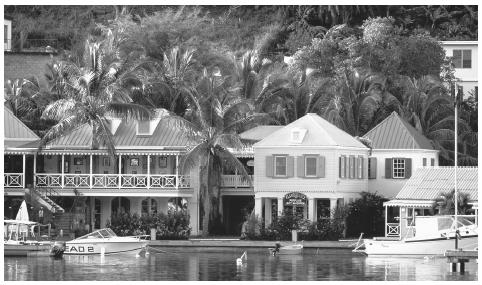
Social Stratification
Classes and Castes. BVI society is divided into "belongers" and "nonbelongers." As a term of identity "belonger" refers to people of BVI parentage or birth who hold BVI citizenship. Individuals of parentage from other Caribbean countries, and who constitute half of the total BVI population, are designated "nonbelongers," regardless of whether they were born in the BVI. Belongers have unrestricted rights to landownership and are given preference in hiring and in the allocation of trade licenses.
Symbols of Social Stratification. There is an emerging structure of social and economic difference, based upon differential access to the country's economic resources. Most BVIslanders own their own home and most households have telephones, televisions, and stereos. Principle symbols of high social status are designer fashions, travel to Puerto Rico or the US to shop or for medical care, ownership of an expensive automobile, and a large house.
Political Life
Government. The BVI is a British dependent territory with a locally elected government that is responsible for the country's internal and financial affairs. A crown-appointed governor possesses reserved legislative powers in the areas of defense and internal security, external affairs, conditions of service of public officers, and the courts. The government is headed by a chief minister and a cabinet of three other ministers, all of whom are selected from among members of the Legislative Council. The Legislative Council consists of thirteen members elected by direct popular vote—one member from each of nine electoral districts, and four at-large members. Elections to the Legislative Council are held at least once every four years and are structured by a party system. The four major BVI political parties are the Virgin Islands Party (VIP), National Democratic Party (NDP), United Party (UP), and Concerned Citizens Movement (CCM).
Leadership and Political Officials. Since 1986 the chief minister and his government have come from the Virgin Islands Party (VIP). The founder of the VIP, H. Lavity Stoutt, was the first popularly elected chief minister following constitutional reform in 1967. At the time of his death in office in 1995 Stoutt had served four terms and was the
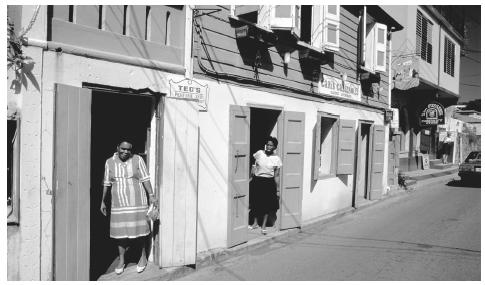
Social Problems and Control. With economic and demographic growth, the BVI has experienced some increase in crime, and there is increased vigilance with respect to drug use and possession of fire arms. In general, however, the BVI is relatively crime-free and experiences little in the way of ethnic or racial strife.
Military Activity. The BVI maintains no domestic military, depending entirely upon the UK for its external security.
Social Welfare and Change Programs
Family and church play central roles in caring for the disabled, the sick, the indigent, and the elderly. The 1979 establishment of a Social Security Board and the 1981 completion of a new hospital in Road Town also provide formal structures for a national health and welfare policy. A Woman's Desk, established in the early 1990s as part of the Chief Minister's Office has developed highly successful educational and intervention programs in the areas of women's health and domestic violence, and community meetings held through the country in 1998–1999 motivated a series of reforms in citizenship law.
Nongovernmental Organizations and Other Associations
Non-governmental organizations in the BVI provide assistance in areas as wide-ranging as environmental management and youth boating safety. The Rotary and Lions Clubs provide important assistance to youth groups and local schools, and the Hotel and Commerce Association is active in tourism development policies. Through its association with regional organizations such as OECS (Organization of Eastern Caribbean States) and international organizations such as UNESCO and the UN, the BVI has secured grants for development of roads and bridges, airport expansion and educational facilities.
Gender Roles and Statuses
Division of Labor by Gender. Historically, women and men shared responsibility for the welfare of the household, with women gardening, cooking, sewing, and keeping household accounts and men opening new gardens, building houses, pasturing livestock, sailing, fishing, and traveling to other islands as agricultural laborers. Present-day BVI women hold the majority of positions in education and occupy a significant number of senior positions in the civil service. BVI men occupy almost all public offices as well as a significant number of upper-level management positions in the private sector. Nationals from other Caribbean countries are the majority of service workers, with men working in construction and boat maintenance and repair and as gardeners and cooks, and women working as clerks, secretaries, housekeepers, and waitresses.
The Relative Status of Women and Men. Men tend to participate in public life through membership in civic associations and daily information exchange, while women participate through the church and their positions in the civil service. Both men and women see their activities as contributing importantly to their community. While BVI men are more active in politics and law, women influence public life through their roles as educators and their leadership in community events such as Festival. Both men and women have suffrage at age of eighteen. The status of men and women alike is measured in terms of the strong independent and entrepreneurial spirit that is held to be characteristic of British Virgin Islanders of both genders.
Marriage, Family, and Kinship
Marriage. As is common throughout the Caribbean, individuals may enter into unions without marriage, although there is social preference for and a higher social status accrues to a legal marriage union.
Domestic Unit. While households made up of a married couple and their children are held to be the norm, the basic BVI family structure is extended, and households made up of a woman, her children, and their offspring, or of siblings and their offspring are common. Even a household headed by a married couple may include children from previous or "outside" relationships, godchildren, or children of other family members.
Inheritance. Inheritance of money and goods follows British Common Law, whereas inheritance of rights and tenancy to family land may or may not be transferred through legal mechanisms.
Kin Groups. The family, understood as a widespread association of kin linked by blood and common name, is the basis for social identity and standing and is a primary source of social and economic support. Members of an extended kindred tend to live in the same area or community, building their individual homes on jointly held family land. BVI family names are associated with specific BVI places or communities, and these in turn are associated with particular activities (such as sailing, business, agriculture, education) or proclivities. Upon meeting someone new, a British Virgin Islander might ask, "Who are you for?" The genealogy that is supplied in response will be used to locate that individual in the BVI social universe.
Socialization
Child Rearing and Education. The raising and care of children is considered to be a responsibility of the parents and their close relatives and friends. Infants are carried close to the body, protected from the sun by umbrellas and from breezes by hats, blankets and booties. Children are raised to dress neatly, to be clean, and to be respectful to all persons older than they are. Young girls are expected to stay close to home, while young boys are allowed to venture farther, with fewer constraints. The national literacy rate of 98 percent is a reflection of the value placed on education by British Virgin Islanders. Compulsory education was introduced for children ages five through twelve in 1890, and secondary education was introduced in 1943. Today there are eighteen public schools and eleven private primary schools on four islands, and two public high schools. Both girls and boys are expected to complete their education through high school.
Higher Education. A national college, H. Lavity Stoutt Community College, was opened in 1990.
Etiquette
British Virgin Islanders place great importance on mannerly behavior. The right of individuals to privacy also is held dear, so that one should not call out a person's name from afar, nor inquire about another person's whereabouts or business. Among the older generation, friends of either gender may be addressed formally as "Mr.," "Mrs.," or "Miss"
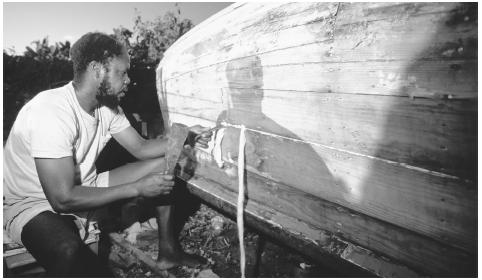
Religion
Religious Beliefs. Christianity is the prevailing BVI religion, with 45 percent of the population Methodist, 21 percent Anglican, 18 percent Baptist or Pentecostal, and 6 percent Roman Catholic.
Rituals and Holy Places. BVI churches are the source of much social welfare and the center of regular social contact. The AM radio station opens its daily broadcast with a two hour devotional service, and public prayer opens the school day and most public events. During October and November, farm produce and home baked goods are brought into BVI churches, and children perform special hymns and recitations, in an annual Harvest Festival. In August, congregations join in commemorating emancipation with a special service at the site where the emancipation proclamation was read on 1 August 1834.
Death and the Afterlife. Deaths are principal occasions for family members to return home, and funerals and memorial services are announced and lists of relevant mourners are broadcast regularly over the radio.
Medicine and Health Care
A public hospital, opened in 1922, provides surgical and emergency care as well as some outpatient services and ambulatory care. However, there is no national health insurance, and most health care must be sought through private health providers. As is the case in many Caribbean countries, care is taken to avoid exposure to the chill night or early morning air, in the belief that it can cause bodily imbalance leading to sickness. For similar reasons, hot liquid taken in the morning is believed to be essential to restoring the balance that is the basis of good health. Seawater is believed to have healthful benefits, and many British Virgin Islanders start their morning with a "sea bathe." Colds, headaches, and chronic conditions may be treated with a variety of herbal remedies as prescribed by knowledgeable elders and "setters," individuals who also specialize in body manipulation and massage.
Secular Celebrations
The major national holidays are New Year's Day (1 January), Commonwealth Day (13 March), Sovereign's
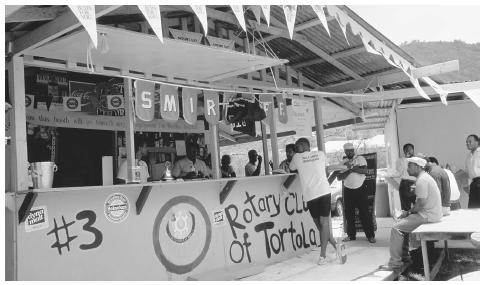
The Arts and Humanities
Support for the Arts. The work of BVI artists is prominently displayed in public buildings, but there is no formal support of artists in the form of public grants or vigorous school training programs. H. Lavity Stoutt Community College has instituted a program of Virgin Islands studies to encourage and develop local art forms, as well as to revive traditional BVI crafts such as strawwork, boat-building, and iron work.
Literature. The British Virgin Islands has rich oral tradition, which includes the recitation of folktales in homes and at family gatherings, and more formal poetic recitations in schools and churches. A local group of writers convenes regularly to share their poems and stories, and several BVIslanders have had their poems, folktales and stories published locally and regionally. The memoir is another popular genre of BVI writing.
Performance Arts. A BVI folk dance troupe and local fungi bands (bands made up of guitar, ukulele, washtub bass, scratch gourd, and triangle that play calypso and folk tunes) perform regularly at local cultural events, and represent the BVI at regional cultural festivals and at BVI Tourist Board events abroad. Instruction in classical, jazz, and Caribbean music such as steel pan and fungi is offered as part of the school music curriculum, and local musical talent is showcased at school concerts, in public performance for tourists, and during the annual Festival commemorating emancipation. Local and international calypso performers also are central features of Festival shows, as are BVI fungi bands, steel pan orchestras and brass bands. A musical series sponsored by the community college brings classical and jazz performers to the BVI bimonthly from October to March.
The State of the Physical and Social Sciences
The establishment in 1990 of a national tertiary educational institution has enhanced the development of BVI physical and social sciences. A nursing education program and a marine studies program contribute in the area of the physical sciences, and a Virgin Islands Studies program is developing a curriculum focused on the analysis of BVI cultural life and social and political institutions.
Bibliography
Bowen, W. Errol. "Development, Immigration, and Politics in a Preindustrial Society: A Study of Social Change in the British Virgin Islands in the 1960s." Caribbean Studies 16 (1): 67–85, 1976.
Cohen, Colleen Ballerino. "'This is de test': Festival and the Cultural Politics of Nation Building in the British Virgin Islands." American Ethnologist 25 (2): 189– 214, 1998.
——. "Women as Tourism Producers and Product in the British Virgin Islands." In Women as Producers and Consumers of Tourism in Developing Regions, ed. Y. Apostolopoulos, S. Sonmez, and D. J. Timothy, 2000.
——. "Marketing Paradise, Making Nation." Annals of Tourism Research (22) 2: 404–421, 2001.
Cohen, Colleen Ballerino, and Mascia-Lees, Frances E. "The British Virgin Islands as Nation and Desti-Nation: Representing and Siting Identity in a Postcolonial Caribbean." Social Analysis 33 (September): 130–151, 1993.
Dookhan, Isaac. A History of the British Virgin Islands 1672–1970, 1975.
Encontre, Pierre. Why Does the Tourist Dollar Matter? An Introduction to the Economics of Tourism in the British Virgin Islands, 1989.
Harrigan, Norwell, and Varlack, Pearl. The Virgin Islands Story, 1988.
Maurer, Bill. Recharting the Caribbean: Land, Law, and Citizenship in the British Virgin Islands, 1988.
McGlynn, Frank. "Marginality and Flux: An Afro-Caribbean Community Through Two Centuries." Ph.D. dissertation, University of Pittsburgh, 1977.
O'Neal, Michael. "British Virgin Islands Transformations: Anthropological Perspectives." Ph.D. dissertation, Union Graduate School, Cincinnati, 1985.
O'Neal, Michael, and Maurer, Bill. "The Socioeconomic Context." In Challenge and Change: The Awakening of a People, British Virgin Islands, 1992.
Pickering, Vernon W. A Concise History of the British Virgin Islands, 1987.
—C OLLEEN B ALLERINO C OHEN AND M ICHAEL E. O'N EAL
Very Respectfully,
Oliver H. Miller, Ph.D.
-Good morning, good afternoon, good night is said when coming into contact with strangers and adults before a discussion is carried on.
-Cursing in public, espicially by young adults and young people is considered extremely rude if an adult hears you.
I was told that my father Henry Gumbs was living there on the island and has many children there.
Are there any Gumbs left there?
This sounds like a great place and live and die
and patties (meat and fish-filled dumplings) also are making their way into the BVI diet.
This statement is inaccurate. I remember eating local patties as a child and I am 37. Please correct this statement.
Thank You
I am a BVIslander and there are quite a lot of things in this otherwise-excellent article that aren't so! But I guess from a friend's submission you don't post corrections or ommissions.
We have vacationed in Cane Garden Bay for over 20 years - the BVI is the most beautiful place on earth.
Thank you,
Barbara Walton-Faria
Walden University
Teacher Leadership Program
2009 Rhode Island Teacher of the Year
Thank you!
I love it!!!
Felix Pierre Louis.